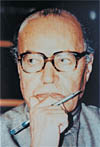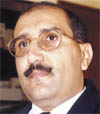Prof. Farid Al-Attas: “There are 3 conditions for successful democratization.” [Archives:1999/52/Interview]
There are some 8 million people in Indonesia, Malaysia and Singapore who trace their origin to Yemen. Their forebears left several centuries ago. Today, they make an important contribution to their societies. Members of this community have risen to high positions – whether in government, business or academia. They also hold the potential of serving as an important bridge linking Southeast Asia on the one hand, and Yemen and the Arab World on the other. In the recent past, visits have been exchanged at an ever rising pace.
Last week, Farid Al-Attas concluded a two-week visit to Yemen. The purpose was both personal and professional.
Farid, 27, holds a BA in economics from the University of Oregon and an MA and Ph.D. in sociology from the Johns Hopkins University, US.
In 1989, Al-Attas became a lecturer at the University of Malayo in Kuala Lumpur, Malaysia. In 1992, he joined the National University of Singapore’s Sociology Department. He teaches sociological theory and the sociology of development as well as political economy.
Dr. Salah Haddash, Managing Editor of Yemen Times, talked to him and filed the following interview.
Q: What is the purpose of your visit to Yemen?
A: I’m here for my research project. I’m conducting research on the state of social sciences in selected developing countries. In this project, I’m trying to understand the way in which social sciences are dependent on American and European ideas, theories, financial aid.
I want to see to what extent alternatives in terms of theories, concepts and organizations have been created in developing countries. So, I have visited Sanaa and Aden universities for that purpose.
This is the main purpose. At the same time, while I’m here, it was an opportunity to see the country from which my forebears came.
Q: Does your study include the curricula?
A: Yes, I plan to return to Yemen next year for a longer stay. I realized that it will be good to study would-be changes in the development of curricula. For example, in Aden University, there was very radical change in curriculum development because they were basically Marxist-based. Now many changes have been made. So, I want to look at these changes.
Q: Could you tell us a little bit about the Yemeni community in South-East Asian countries?
A: When we say the Yemeni community, we are referring to people who trace their origin to Yemen. The majority of people of Yemeni origin (more than 90%) in South Asia are from Hadhramaut. There are others who come from other areas of Yemen.
The reason for these people’s emigration from Yemen has to do with some push factors over here as well as some pull factors at the receiving end.
The push factors have to do with the economic conditions in Hadhramaut, at some point in the history of the region. Decline in agricultural production, famines and droughts made people leave to different parts of the world. But most of them emigrated to South-East Asia, especially to Indonesia, Malaysia, Singapore, and the Southern part of Thailand., which offered better opportunities.
This took place over a period of 700 years, making it one of the most remarkable cases of migration. Yemenis had been emigrating to several parts of the Indian ocean even before Islam. The waves of emigration which took place after Islam in large scales to South Asia started from the beginning of the 16th century with still larger scale migration taking place in the 18th and 19th centuries.
Q: Are these communities integrated into their new homes?
A: Yes and no. They are integrated in the sense that there is a lot of inter-marriage with the local community. They are, of course, an integral part of the local economic, social and political structure. At the same time, their descent from the first Yemeni immigrants gives them a special attachment and cultural aspects. For example, they still maintain some Yemeni marriage customs, music and dance.
Q: How compatible are a religion-based culture with the values of a secular state?
A: We live in secular states, alright. However, Malaysia and Indonesia are states in which the majority are Muslims. In these states, it is possible to apply the Sharia and other laws. For example, family law is according to the Sharia law, not to the secular law. In Singapore, people marry according to the Sharia law if they wish. In terms of other aspects of life, for example, in the economy, it is possible for people to adapt Islamic banking practices. Islamic banks and insurance firms are available.
Q: How active is the Yemeni community in public life?
A: This depends on the country. In Indonesia and Malaysia, they have played some role. Yemenis or people of Yemeni origin fought for independence and they were instrumental in the emergence of political parties during the colonial period. For example, among the founders of the United Malay National Organization, the ruling party in Malaysia, are some people of Yemeni origin. Some Indonesian parties were formed by some people of Yemeni origin.
After the colonial period, from time to time, you have people of Yemeni origin in high positions in government. They have played roles in the religious administration of the country. Many Muftis in various states in Indonesia are of Yemeni origin.
Q: Do emigrant Yemenis form associations or NGOs?
A: They don’t form associations for themselves. They don’t need that. But, they are active in various associations. From the time they settled in the South Asian countries, they did not separate from the locals. Since they were involved in the conversion of people to Islam and they married local people, they also formed associations and groups that are inclusive of others. In other words, they made themselves a part of the local community. So, you find that, if they formed a religious organization, it will not be a religious organization of Yemenis only. It will be for everybody.
Q: Do they have Arab newspapers of their own?
A: In the past, in Indonesia for example, we had several newspapers published in Arabic. But, after some generations, the ability to read and write Arabic on that level declined. They began to write in Malaysian or Indonesian.
Today, there are some attempts to revive Arabic. For example, the magazine we publish “Al-Mahjar” is bilingual, in English as well as in Arabic. Issued in 1996, the purpose behind publishing this magazine was to inform the Yemeni people wherever they exist about the Mahjar (diaspora) outside of Yemen and to inform people in the Mahjar about Yemen in terms of culture, history, politics and social issues.
This magazine is published three times a year and we hope to increase it.
What we really need is the cooperation of people outside of Singapore, especially in Yemen and the Middle East or Yemenis in Europe and America to contribute articles to the magazine.
Q: How do you assess Yemen’s democratization process?
A: Although Yemen is among the poorest of the Arab countries, it is also probably the most democratic. In the Middle East, I can only think of Israel and Turkey as democratic and liberal.
In the world experience in democratization, some countries (middle-income countries) only became democratic when they reached a certain level of development. Most democratizing countries in the Third World are not countries with high economic growth. You can see the same thing in Yemen which is a poor country, but is most definitely democratizing. So, economic growth is not the main condition.
I think that there are 3 conditions. One is that a permanent economic group in a country would support the government morally and financially. Now, how does democracy maintain itself in a country? Well, there has to be a strong financial base for the country with a business class (middle class) which gives that support.
Second, there should be a high degree of cohesion among the political elite. They must agree on basic policies.
Third, there should not be armed resistance against the state. If you have these conditions, the country can proceed to democratize even if it is not economically developed.
Q: A secular state is one of the conditions of democracy in Europe. Is it applicable to Third World countries?
A: No, secularism is part of the historical experience of Europe but it is not an absolute condition for democracy. One could presumably have a non-secular state based on, say, religious principles run along democratic lines. Israel is an example.
We have to distinguish between the ideology of the state which could be religious and the procedures which may be democratic or not democratic. We could have an Islamic state which is run along democratic lines, along the lines of tribal political system or along the lines of a republic. That republic may be democratic or not democratic. But a political system has an ideology and procedures.
If we refer to democracy as consisting of certain procedures that distinguish it from dictatorship, there is no reason why democratic procedures cannot be applied in a state which is based on Islamic or a Christian ideology.
Q: What role does public sophistication play?
A: It plays a big role in the sense that democracy must be meaningful to the people that it is supposed to serve. These people have to understand the kind of system they live in.
In India’s experience, illiteracy was a big problem, and I think the same situation is taking place in Yemen. Democracy is a process and a procedural system which evolves and improves. It has to evolve and improve in education, culture, and in general, in the level of awareness of the public.
Q: Do you see Yemeni women playing a bigger role in public life?
A: We go back to the democratic experience in the West, where large blocks of the population were disenfranchised. In the United States, for example, Americans of African origin did not have the right to vote until very recently. European women got involved in politics recently.
It is wrong to insist a visible role for women in politics. It is wrong to assume that if women are not involved in politics, they are not liberated or that the system is not democratic. They must have the right. If they choose to exercise it or not is their prerogative.
——
[archive-e:52-v:1999-y:1999-d:1999-12-28-p:./1998/iss52/intrview.htm]


